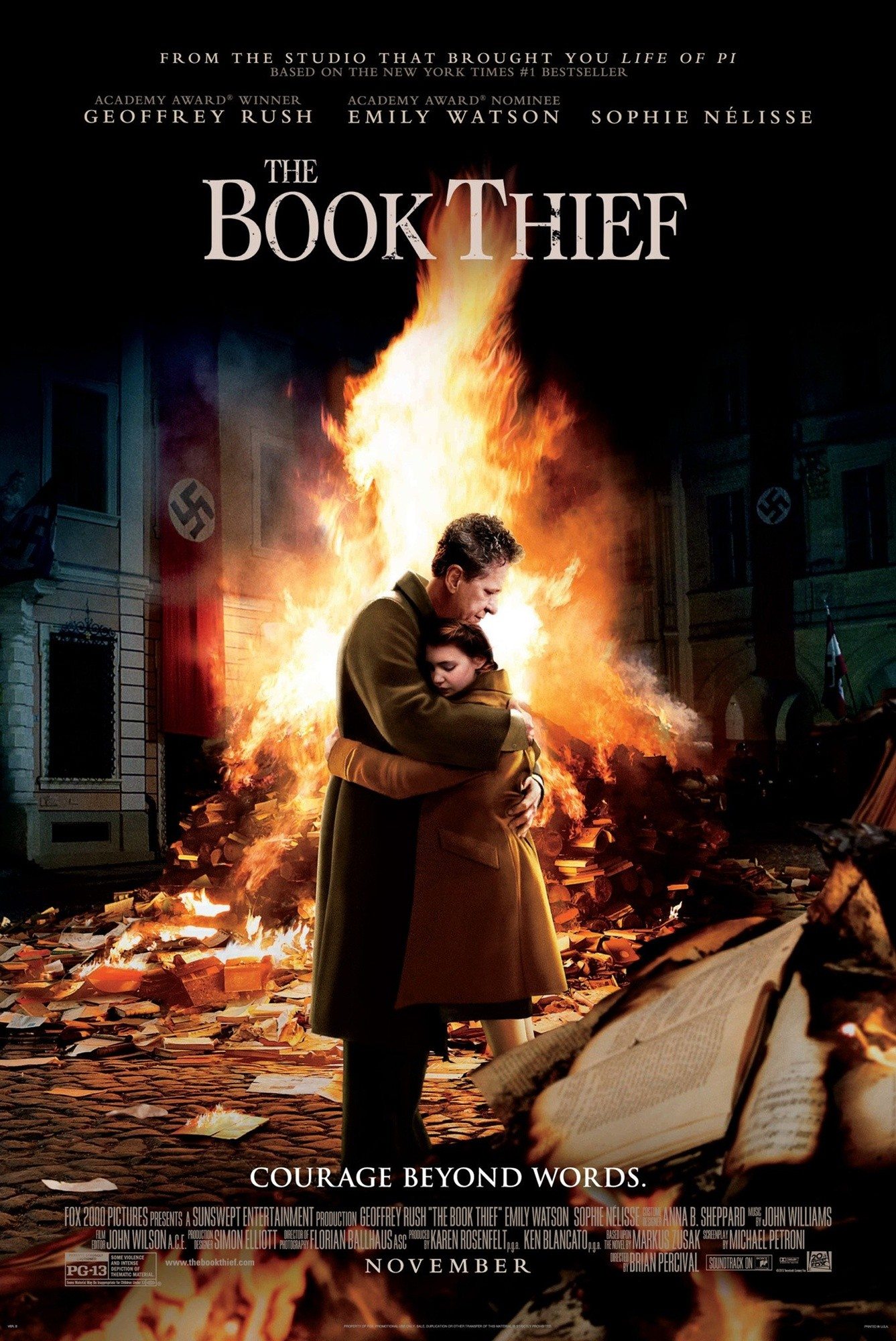directed by Brian Percival (2013)
This was a really well made adaptation of the award winning novel by Markus Zusak. With the great performances and high production values in this WWII coming of age period piece, I wouldn't be surprised if it gets tons of nominations once the award season rolls around. I enjoyed it while I watched it, and took pleasure in the ways the story was clever with the construction, making note of all its pointed writerly references. What's the title of the rescued banned book read to the Jew hiding in basement? The Invisible Man of course :) Death as the narrator, voiced by Roger Allam, had some of the most poetic and beautiful lines. And it's definitely got book loving as its hardcover core value, but its greatest strength is in terms of showing the development of a writerly personality.
The girl, played by Monsier Lazar's Sophie Nélisse, can't read, but she's got a brain and she works hard to learn with the help of her foster father - Geoffrey Rush in one of his sweetest roles ever. He's not a bastard for a change! He paints her an alphabet wall in the basement, where she can chalk the words she's learning in one of the best depictions of DIY dictionary use ever. (The Color Purple and Nettie's homemade post it notes is another good one.) It's the foster mom that's the shrew with the hidden heart of gold that shoulders some of the antagonist work until the real bad guys show up. (Nazis in case you were wondering, duh.) And that stereotypical female role, with Emily Watson wielding the sharp tongue of the witchy wife, paired off with her sadsack husband, that leads me into the area of criticism.
The story is super sentimental with fairly shallow characterisations of most of the supporting roles, and it's trying to be profound, but I didn't buy its using a backdrop of genocide and fascism to dramatise a very personal story.
For starters, I didn't like how it had the mom being all megabitch. Hohum for positive depictions of female power. But especially the fact that it was another case of whitewashing history is what irked me.
There's a heavy handed metaphorical moment where Mein Kampf gets it's inner pages painted out so the girl can put her words there.
Yes that's such a sweet idea eh? And of course it's a humanist perspective too - a book of hateful ideology repurposed for creative use - but I also think it's a dangerous one.
It's analogous to the scene where the Nazis are burning the books they see as degenerate - the ideas which the regime figured were dangerous to their ideology.
But you can't and shouldn't try to erase or skew historical truth! It's such a revisionist view of Nazi Germany too. Very similar to Life is Beautiful, which I also found offensive in terms of presenting a false view of the reality of the horrors of Italian fascism. By implication, we're supposed to believe that all those Germans were of the same mind as the protagonists, or that there were sooo many of them with their morals and ethics held hostage by their crazy leaders. And while there's some truth to that on an individualistic level, for the most part it's a goddamn lie. And that kind of lie is the most insidious of all, because it allows us to keep on accepting bullshit ideas and excuses for NOT behaving in human ways to one another. It's the system man! What can you do against an evil amorphous bureaucracy? Howl at Hitler in the safety of an echo chamber? shrug. The truth is we ARE the system; it's made up of all of us acting in concert in ways that exploit and dehumanize others. We're all complicit in that we benefit from the suffering and exploitation of many many people. Just one example: the people who made the technology we're using to read this are, at the very least wage slaves, if not actual slaves!
Yes, there are repressive regimes where it's dangerous to display your opposition, but I prefer stories that showcase the bravery of open resistance. While I understand the fear that keeps people silent in the face of injustice, I think it's sad and retro to make heroes of people hiding their beliefs under a bushel because of the hostility of the dominant culture. Because really, Silence = Death; the death of the opportunity for a dialectical process that leads to change, and in truth, actual death. Othering, hatred and genocide didn't end with WWII eh?
The best thing you can take away from this flick is the importance of using your voice to speak out on anything that matters to you. Just doing that creates space for others to do the same.


1 comment:
I enjoyed reading your review.
I can never do this kind of writing.
I admire you, thank you.
Post a Comment